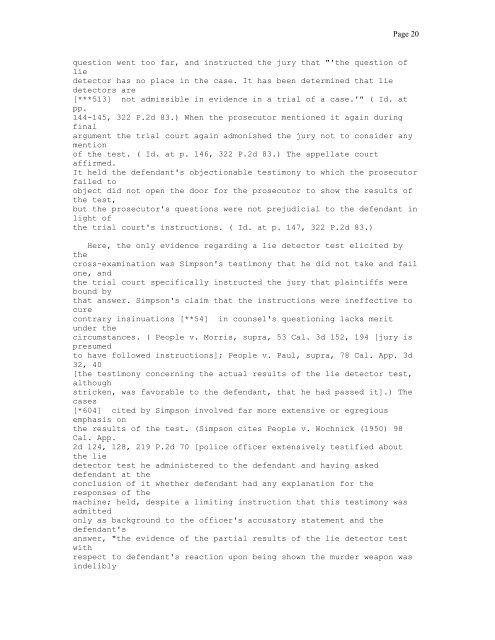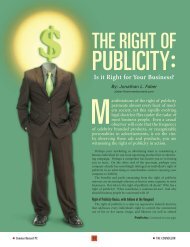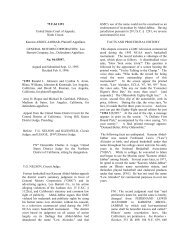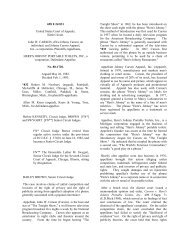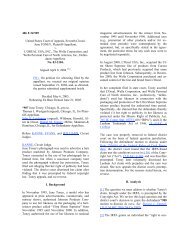Rufo v. OJ Simpson - Right Of Publicity
Rufo v. OJ Simpson - Right Of Publicity
Rufo v. OJ Simpson - Right Of Publicity
Create successful ePaper yourself
Turn your PDF publications into a flip-book with our unique Google optimized e-Paper software.
Page 20<br />
question went too far, and instructed the jury that "'the question of<br />
lie<br />
detector has no place in the case. It has been determined that lie<br />
detectors are<br />
[***513] not admissible in evidence in a trial of a case.'" ( Id. at<br />
pp.<br />
144-145, 322 P.2d 83.) When the prosecutor mentioned it again during<br />
final<br />
argument the trial court again admonished the jury not to consider any<br />
mention<br />
of the test. ( Id. at p. 146, 322 P.2d 83.) The appellate court<br />
affirmed.<br />
It held the defendant's objectionable testimony to which the prosecutor<br />
failed to<br />
object did not open the door for the prosecutor to show the results of<br />
the test,<br />
but the prosecutor's questions were not prejudicial to the defendant in<br />
light of<br />
the trial court's instructions. ( Id. at p. 147, 322 P.2d 83.)<br />
Here, the only evidence regarding a lie detector test elicited by<br />
the<br />
cross-examination was <strong>Simpson</strong>'s testimony that he did not take and fail<br />
one, and<br />
the trial court specifically instructed the jury that plaintiffs were<br />
bound by<br />
that answer. <strong>Simpson</strong>'s claim that the instructions were ineffective to<br />
cure<br />
contrary insinuations [**54] in counsel's questioning lacks merit<br />
under the<br />
circumstances. ( People v. Morris, supra, 53 Cal. 3d 152, 194 [jury is<br />
presumed<br />
to have followed instructions]; People v. Paul, supra, 78 Cal. App. 3d<br />
32, 40<br />
[the testimony concerning the actual results of the lie detector test,<br />
although<br />
stricken, was favorable to the defendant, that he had passed it].) The<br />
cases<br />
[*604] cited by <strong>Simpson</strong> involved far more extensive or egregious<br />
emphasis on<br />
the results of the test. (<strong>Simpson</strong> cites People v. Wochnick (1950) 98<br />
Cal. App.<br />
2d 124, 128, 219 P.2d 70 [police officer extensively testified about<br />
the lie<br />
detector test he administered to the defendant and having asked<br />
defendant at the<br />
conclusion of it whether defendant had any explanation for the<br />
responses of the<br />
machine; held, despite a limiting instruction that this testimony was<br />
admitted<br />
only as background to the officer's accusatory statement and the<br />
defendant's<br />
answer, "the evidence of the partial results of the lie detector test<br />
with<br />
respect to defendant's reaction upon being shown the murder weapon was<br />
indelibly


